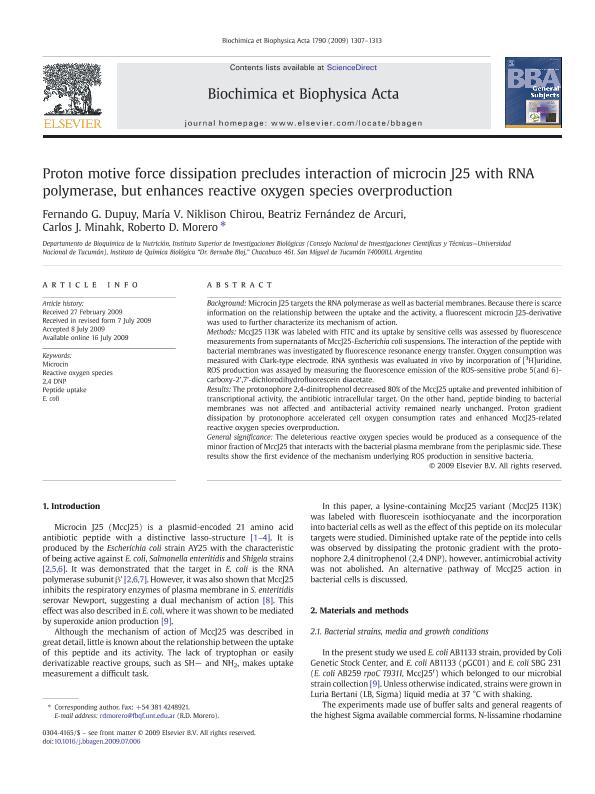Artículo
Proton motive force dissipation precludes interaction of microcin J25 with RNA polymerase, but enhances reactive oxygen species overproduction
Dupuy, Fernando Gabriel ; Niklison Chirou, Maria Victoria
; Niklison Chirou, Maria Victoria ; Fernandez de Arcuri, Beatriz; Minahk, Carlos Javier
; Fernandez de Arcuri, Beatriz; Minahk, Carlos Javier ; Morero, Roberto Dionisio
; Morero, Roberto Dionisio
 ; Niklison Chirou, Maria Victoria
; Niklison Chirou, Maria Victoria ; Fernandez de Arcuri, Beatriz; Minahk, Carlos Javier
; Fernandez de Arcuri, Beatriz; Minahk, Carlos Javier ; Morero, Roberto Dionisio
; Morero, Roberto Dionisio
Fecha de publicación:
10/2009
Editorial:
Elsevier Science
Revista:
Biochimica et Biophysica Acta- General Subjects
ISSN:
0304-4165
Idioma:
Inglés
Tipo de recurso:
Artículo publicado
Clasificación temática:
Resumen
Background: Microcin J25 targets the RNA polymerase as well as bacterial membranes. Because there is scarce information on the relationship between the uptake and the activity, a fluorescent microcin J25-derivative was used to further characterize its mechanism of action. Methods: MccJ25 I13K was labeled with FITC and its uptake by sensitive cells was assessed by fluorescence measurements from supernatants of MccJ25-Escherichia coli suspensions. The interaction of the peptide with bacterial membranes was investigated by fluorescence resonance energy transfer. Oxygen consumption was measured with Clark-type electrode. RNA synthesis was evaluated in vivo by incorporation of [3H]uridine. ROS production was assayed by measuring the fluorescence emission of the ROS-sensitive probe 5(and 6)-carboxy-2',7'-dichlorodihydrofluorescein diacetate. Results: The protonophore 2,4-dinitrophenol decreased 80% of the MccJ25 uptake and prevented inhibition of transcriptional activity, the antibiotic intracellular target. On the other hand, peptide binding to bacterial membranes was not affected and antibacterial activity remained nearly unchanged. Proton gradient dissipation by protonophore accelerated cell oxygen consumption rates and enhanced MccJ25-related reactive oxygen species overproduction. General significance: The deleterious reactive oxygen species would be produced as a consequence of the minor fraction of MccJ25 that interacts with the bacterial plasma membrane from the periplasmic side. These results show the first evidence of the mechanism underlying ROS production in sensitive bacteria.
Palabras clave:
2,4 Dnp
,
E. Coli
,
Microcin
,
Peptide Uptake
,
Reactive Oxygen Species
Archivos asociados
Licencia
Identificadores
Colecciones
Articulos(CIQUIBIC)
Articulos de CENTRO DE INVEST.EN QCA.BIOL.DE CORDOBA (P)
Articulos de CENTRO DE INVEST.EN QCA.BIOL.DE CORDOBA (P)
Articulos(INSIBIO)
Articulos de INST.SUP.DE INVEST.BIOLOGICAS
Articulos de INST.SUP.DE INVEST.BIOLOGICAS
Citación
Dupuy, Fernando Gabriel; Niklison Chirou, Maria Victoria; Fernandez de Arcuri, Beatriz; Minahk, Carlos Javier; Morero, Roberto Dionisio; Proton motive force dissipation precludes interaction of microcin J25 with RNA polymerase, but enhances reactive oxygen species overproduction; Elsevier Science; Biochimica et Biophysica Acta- General Subjects; 1790; 10; 10-2009; 1307-1313
Compartir
Altmétricas



